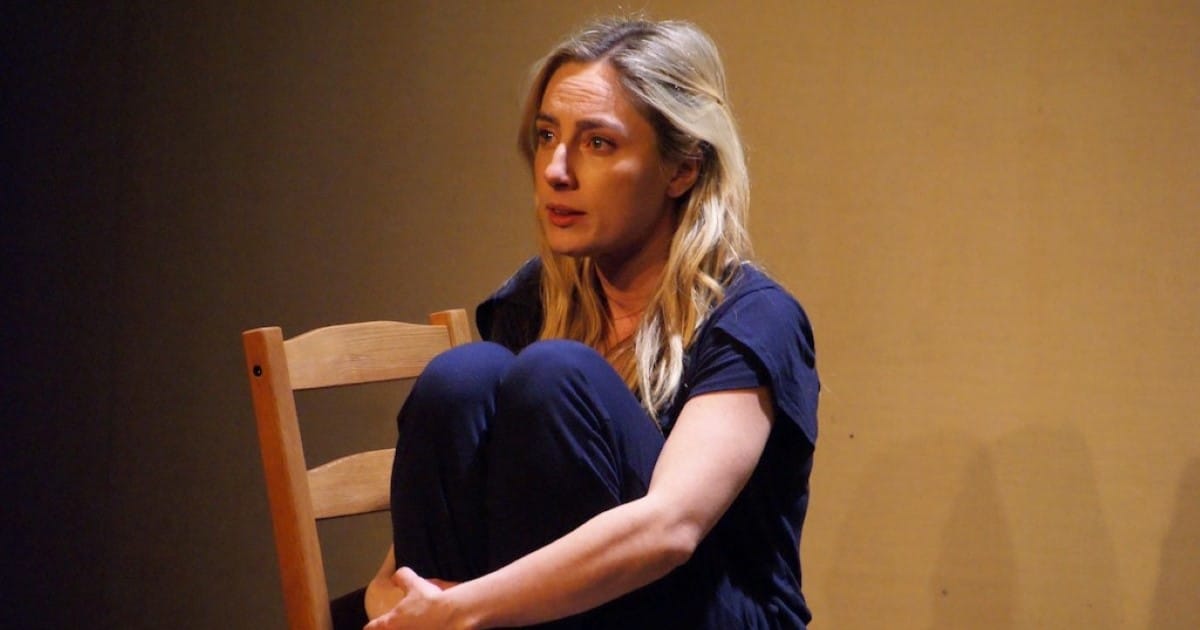Tayla Kenyon and James Piercy’s cleverly structured and well performed single-hander Fluff covers familiar territory: the crushing burden of dementia. Their eponymous central character Fluff, so nicknamed because she has to be pulled ungraciously by wispy baby hair from mother’s womb, is deeply flawed. Her evolving memory loss, ghastly and unforgiving as it is, saves her the pain of recollecting some of the truly awful things she has both suffered and engineered. Unreliable narration is a character trait here as much as a reflection of incipient illness. Yet Fluff, aided by restrained direction from Danäe Cambrook, emerges ultimately as a figure who deserves redemption. You may not like her. Empathy is easier to find.
“I was an unbearably ugly child” Fluff (a skilled, enigmatic performance from co-writer Kenyon) tells us early on. In many respects she is a pretty ugly adult too: vengeful, deceitful, manipulative and inattentive to the feelings of others. As a schoolchild Fluff complains of bullying, yet her recollections are inconsistent and redolent of artifice. Although fired from her job as a science tutor for being “a drunk and a bad teacher”, she equally merits dismissal for a campaign of petty retribution against a troubled, at risk pupil. Her alcohol addiction leads directly to a domestic tragedy of almost unimaginable heartbreak.
Yet Fluff is a victim too. A teen fling with the school heartthrob Michael Tilly (“everyone was silly for Tilly” she tells us) leaves her the butt of merciless mockery and, seemingly, an unwanted pregnancy. Mum is a drinker too and resents the parental burden imposed by infant Fluff’s presence. Much-loved dad himself succumbs to slow onset dementia; the seeds of which Fluff learns to her horror that she carries in her own DNA. It is Fluff who, in an awful foreshadowing of her own destiny, takes the burden of caring for the decaying parent.
Then there are the effects of the illness itself. Words go missing from Fluff’s vocabulary. Memories jar. Events in her life become confabulated with those in the lives of others. She struggles, often angrily and resentfully, to makes sense of it all. For those who have ever been around dementia sufferers this will be painfully familiar stuff.
Kenyon and Piercy’s slow-reveal narrative shifts seamlessly between events in Fluff’s life and a birthday party in what seems to be a care home. The identity of the mysterious visitor who insists on touching her face and giving her gifts is carefully camouflaged until late on. The theme here is familiar, the execution is refreshingly high-quality.
Writers: Tayla Kenyon and James Piercy
Director: Danäe Cambrook
More Recent Reviews
The King of Hollywood. White Bear Theatre.
Douglas Fairbanks was a groundbreaking figure in early American cinema. Celebrated for his larger-than-life screen presence and athletic prowess, [...]
Gay Pride and No Prejudice. Union Theatre
Queer-inspired reimaginations of Jane Austen’s Pride and Prejudice are a more common species than one might initially imagine. Hollywood [...]
Knife on the Table. Cockpit Theatre.
Knife on the Table, Jonathan Brown’s sober ensemble piece about power struggles, knife violence, and relationships in and around [...]


